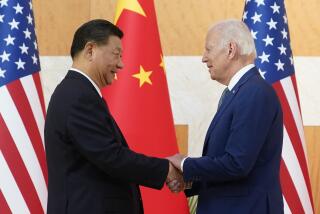REPORTERS’ NOTEBOOK : Forum Ends--and Official Goodwill Too
- Share via
BEIJING — After a week of networking, strategizing and even protesting, more than 20,000 participants in the Non-Governmental Organizations Forum on Women in the distant suburb of Huairou exchanged business cards and hugs while a Chinese band played a farewell tune.
But the moment the closing ceremonies ended, so did the official goodwill that had sustained the grass-roots forum, which opened before the official U.N. Fourth World Conference on Women and closed Friday. Phone lines were cut, and guests were hustled out of hotels.
And worn down by a week of conflict with their Chinese hosts over everything from harassment by secret police to disagreements over transportation, the coordinators of the forum called it quits.
“It was a disaster,” said Facilitating Committee member Salamo Fulivai, from Fiji, “perhaps not from the participants’ point of view, but from an organizational standpoint. China did not live up to its promises, and we should have known better that that’s what you get from an authoritarian state.”
Fulivai praised the spirit of the women who overcame logistic difficulties and intimidation to be effective at the conference.
“While we spent the entire day negotiating, women were out there doing [things] for themselves. If they had a workshop and it rained, they had it anyway. If they wanted to march and were stopped, they found a way. Despite the obstacles, women are going to take a lot home.”
*
For most of the Chinese delegates who attended the conference, the political demonstrations that occurred in connection with it were the first they had ever seen. This provided some touching encounters between the democratic world and the last great Communist country, which maintains a huge security apparatus that shows little tolerance for dissent.
In the early days of the NGO forum, for example, a group of Chinese government delegates came out of a meeting hall and saw Amnesty International protesters carrying black-and-white photographs of female political prisoners around the world, including jailed Chinese journalist Gao Yu.
Not realizing that their government was the object of protest, the Chinese delegates were delighted with the spectacle, producing cameras and asking bystanders to take their pictures with their arms around their “foreign friends.”
Likewise, a group of 300 lesbian-rights demonstrators at Huairou ran into a revealing wall of misunderstanding as they marched down the street chanting and carrying banners that said “Lesbian Rights Are Human Rights.”
A young Chinese university student stood on the edge of the street smiling and applauding. American reporter Susan Lawrence asked the student if she understood the point of the demonstration. “Yes, except for one thing,” responded the student. “Where is Lesbia?”
*
Former U.S. President George Bush was in town this week to speak at a conference sponsored by IMC Global, an Illinois-based fertilizer company. He spread the word about the importance of maintaining good relations in Asia (“I feel qualified to talk about Japan because I’m the guy who threw up on Prime Minister Miyazawa”). And as an “old friend of China” since his first tour here as a diplomat in 1974, Bush commiserated with Beijing for the international pounding it had been getting over the women’s conference.
“I’m not sure this women’s conference has helped anything,” he said. “In fact, I feel somewhat sorry for the Chinese having Bella Abzug running around in China.
“Bella Abzug,” he continued in reference to the brash former New York congresswoman, who has been zipping around the city in her wheelchair and her trademark hats, “has always represented the extremes of the women’s movement. And what is happening is that they’re emphasizing the difficulties . . . emphasizing the demonstrators who are always out there on the cutting edge and the far-out edge.”
Abzug, no stranger to controversy, or to Bush, whom she considers an old friend, smiled. “George Bush stands frozen in what used to be. The very thought of this conference succeeding--which it is--must be terrifying to him, else he would have wished us Godspeed instead of taking cheap shots.”
Earlier in the week, Abzug confronted a representative of the Vatican in the conference center’s narrow hallway, after the Holy See had charged that the conference was anti-family.
“How can a community that doesn’t have any women and children in it talk about the family?” she asked, as a crowd began to gather. The standoff continued until Abzug conceded graciously. “God knows you’re entitled to your opinion,” she said as she wheeled away with a chortle. “God knows.”
*
All week long, conference delegates have huddled in meeting rooms, poring over the wording of the “Platform for Action”--a document delegates will take back to their countries as a benchmark for improving women’s status. The wrangling over language makes the job of the official U.N. interpreters all the harder.
“There was an entire working group discussing the meaning of gender ,” said Evelyn Moggio-Ortiz, who speaks English, French and Spanish. “It’s a concept that doesn’t exist in many languages.”
In Spanish, she explained, genero is a grammatical concept, or it can mean a finely woven fabric. Central American conservatives objected that the word implied the existence of multiple sexes and thus legitimized homosexuality, until a committee decreed the meaning to be simply “the social construct of male and female roles.”
“We’ve spent a lot of time coining new expressions that we hope will become household words,” said Moggio-Ortiz.
Her colleague Igor Korcalov, who speaks Russian, Spanish, English and French, held up a handwritten list filled front and back with neologisms and hard-to-translate expressions: “ Gender-neutral , feminization , latchkey children . . .” it began.
There followed stumbling blocks like Madame Chairman , gentlemen’s agreement and Rights of Man.
*
Throughout the conference, the influx of more than 30,000 women has been blamed for the heavier-than-usual traffic and heightened security that have accompanied it.
But perhaps the most bizarre complaint was that the women tilted the cosmic yin-yang --feminine-masculine--order in Beijing in favor of the feminine side. During the first week of the conference, the city was inundated with unprecedented rainfall, reducing the Huairou site to a sea of mud and contributing to gridlock traffic problems in the capital.
“It’s all very good for China to host the women’s conference,” said a 40-year-old newspaper editor. “But my friends say that women coming from all corners of the world have brought strong femininity to the conference, causing it to rain so much. It seems that this positive-negative theory is reasonable.”
More to Read
Sign up for Essential California
The most important California stories and recommendations in your inbox every morning.
You may occasionally receive promotional content from the Los Angeles Times.










